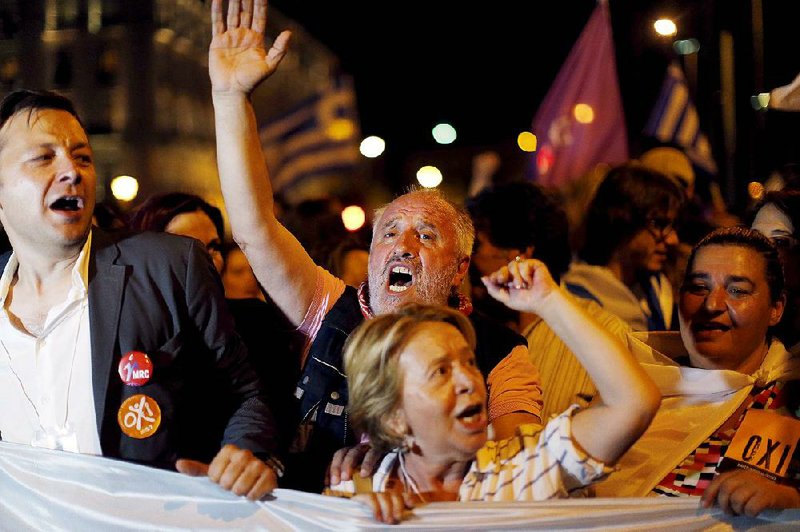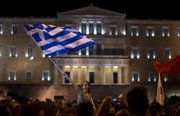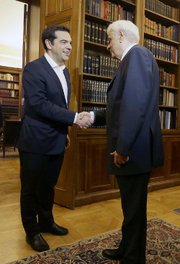ATHENS, Greece -- Greece voted against yielding to further austerity demanded by creditors, leaving Europe's leaders to determine whether the nation can remain in the euro.
Sixty-one percent of voters backed Prime Minister Alexis Tsipras' rejection of further spending cuts and tax increases in a referendum that's also taken the country to the brink of financial collapse.
As the euro dropped in Asian trading and Tsipras' supporters filled Athens' central Syntagma Square waving Greek flags, German Chancellor Angela Merkel and French President Francois Hollande called for an emergency summit Tuesday.
The verdict turns the tables on Merkel and Greece's other creditors, who must now decide whether a financial rescue of the region's most indebted country is still possible. It significantly raises the chances of a Greek exit from the euro currency, as the country's banks run out of cash.
Banks including JPMorgan Chase & Co. said a Greek departure from the euro is now the most likely scenario.
The European Central Bank is meeting today to discuss extending a new lifeline to Greek lenders, which have been closed for a week under capital controls that were imposed by Tsipras to stem withdrawals.
"Our immediate priority is to restore the Greek banking system," Tsipras, 40, said in a speech after the results were announced. "I'm confident that the ECB fully realizes the humanitarian side of the crisis in our country."
A total of 6.16 million Greeks voted in Sunday's referendum, or 62.5 percent of eligible voters. The poll needed a minimum 40 percent turnout to be valid.
"Today we celebrate the victory of democracy," Tsipras said in a televised address to the nation.
While Tsipras now appears to have his wish, his victory in the referendum settled little because the creditors' offer is no longer on the table. There remains the possibility that they could walk away, leaving Greece facing default, financial collapse and expulsion from the eurozone and, in the worst case, from the European Union.
The question is whether European leaders can negotiate with a government that has rejected their conditions for staying in the 19-member currency union, after leaders forced Portugal and Ireland to follow through on similar measures and complete bailout programs.
Tsipras and his Coalition of the Radical Left, or Syriza, swept to power in January after campaigning to end budget cuts forced upon the country by creditors and promising to restore "dignity."
Five months of protracted and often antagonistic negotiations followed and optimism for a deal toward the end of June was suddenly dampened when Tsipras called the referendum just over a week ago, putting an end to talks.
Tsipras said a "no" vote would strengthen his hand to negotiate a better deal for his country. His government has said it believes it would be possible to conclude a deal with creditors within 48 hours.
But European officials and most of Greece's opposition parties painted the referendum as one of whether the country kept using the euro currency -- even though that was not the question asked on the ballot.
"Given the unfavorable conditions last week, you have made a very brave choice," Tsipras told Greeks in his address. "But I am aware that the mandate you gave me is not a mandate for rupture." He said he would resume negotiations immediately.
Syntagma Square turned into a street party Sunday night as supporters of a "no" vote gathered to celebrate.
Waving a Greek flag, John Govesis, 26, said he and his whole family voted "no." "I like freedom. I don't need money from Europe," he said. "This is the only way forward. I have a job, but maybe tomorrow I don't."
As the results were announced, Greek opposition leader Antonis Samaras, the 64-year-old former prime minister, announced his decision to step down in a televised address after campaigning for a "yes" vote.
He urged Greeks to put divisions behind them and hold the government to its promise to find a quick agreement with creditors.
Opposition party New Democracy lawmaker Vangelis Meimarakis said he was expecting Tsipras to keep his pledge for a quick deal.
"If we don't have an agreement within 48 hours as the prime minister promised, then we are being led to a tragedy," he said.
Bank confusion
Time has run out for Greece, which is dealing with an economy in a protracted recession, with high unemployment and banks dangerously low on capital.
Sunday's vote was held after a week of capital controls imposed to halt a bank run, with Greeks restricted to a daily cash withdrawal maximum of $67. Long lines have formed at ATMs, while pensioners without bank cards have thronged the few bank branches opened to allow them access to a maximum $132 for the week. Lines at ATMs swelled again as the initial results of the referendum came in.
There was confusion Sunday night over the fate of bank safety deposit boxes, with Deputy Finance Minister Nadia Valavani saying people would be allowed to remove items but not cash from them, and Alternate Finance Minister Dimitris Mardas later said the issue would have to be legislated.
For some voters, the week of hardship only strengthened their sense that Greece needed to stand up for itself.
At a polling station in a southern neighborhood of Athens, Pantiotis Andrikopoulos, 33, a student, said he planned to cast a "no" vote "because I don't like being blackmailed by the EU." He did not believe European arguments that a "no" vote meant Greeks wanted to leave the eurozone. "I'm for Europe but against the memorandum," he said, as he stood in a long line of people waiting to vote.
He also wasn't worried that Greek banks would remain closed in the event of a no vote. "They're trying to terrorize people with such talk," he said.
For others, the hardship only proved that Greece was in the hands of its creditors and could do little but take whatever terms were being offered. In many cases, they blamed Tsipras' young government for having returned the country to recession when it had shown small signs of recovery just before the January elections.
At a polling place near the archaeological museum in Athens, turnout was low, poll workers said. And people leaving the voting booths seemed split.
"I voted with my heart and also my mind," said Marie Triadafillou, who works in transportation logistics and voted "yes." "I believe when you are in a union, you cannot leave. We say in our country if the sheep leaves the flock, it cannot live."
Since Syriza came to power, the government has been trying to unlock about $7.7 billion from an existing bailout, under which it has received a total of nearly $264 billion, to meet debt payments. That rescue package expired Tuesday, the day the country missed a payment to the International Monetary Fund -- becoming the first developed country to do so.
Of critical importance will be whether the European Central Bank decides to maintain its current lifeline to Greece in the form of emergency liquidity assistance. The assistance, currently at around $99 billion, has been maintained but not increased in past days, leaving the country's financial system in a stranglehold.
The European Central Bank operates on rules according to which it can only continue assistance if Greece is in a bailout. Without an increase, it is unclear how much longer people will be allowed to withdraw $67 a day.
When the government decided to close the banks a week ago, it said they would reopen this Tuesday. But entering the weekend, the banks had only $1.1 billion on hand, Louka Katseli, the head of Greece's banking association, said Friday.
Eurozone summit
Today, Merkel will travel to Paris for talks with Hollande to map out the way forward.
The trip, announced Sunday shortly after polls closed in Greece, is "to jointly assess the situation after the Greek referendum and to address the continuation of Franco-German close cooperation in this matter," the chancellery in Berlin and the Elysee in Paris said in separate emails.
The leaders agreed that the decision of the Greek people is "to be respected" and called for a summit of the euro-area's 19 leaders to be held Tuesday.
Euro-region governments are preparing to wait for Greece to offer proposals that enable the country to stay in the eurozone, according to a European government official with knowledge of the crisis strategy.
The referendum result was "very regrettable for the future of Greece," said Jeroen Dijsselbloem, head of the eurozone finance ministers meeting known as the Eurogroup, which also will meet Tuesday.
Sigmar Gabriel, Germany's vice chancellor and economic minister, told a German newspaper that the Greek government was leading its people "onto a path of bitter austerity and hopelessness."
Tsipras has "torn down the last bridges, across which Europe and Greece could move toward a compromise," Gabriel told Tagesspiegel. "By saying 'no' to the eurozone's rules, as is reflected in the majority 'no' vote, it's difficult to imagine negotiations over an aid package for billions."
Belgian Finance Minister Johan Van Overtveldt said a "no" result "complicates matters," but that the door was open to resume talks immediately.
"What we certainly don't want to do is to take decisions that will threaten the monetary union," he told Belgium's VRT. "Within that framework we can start talks again with the Greek government, literally, within hours."
European Parliament President Martin Schulz said the summit of eurozone leaders planned for Tuesday should discuss a "humanitarian aid program for Greece."
Schulz said in a statement that Athens should make "meaningful and constructive proposals" in the coming hours to get the talks with the other 18 eurozone nations going again. "If not, we are entering a very difficult and even dramatic time," he said.
Information for this article was contributed by Nikos Chrysoloras, Marcus Bensasson, Matthew Campbell, Paul Tugwell, Vassilis Karamanis, Jenny Paris, Ilya Gridneff, Eleni Chrepa, Emma O'Brien, Brian Parkin and Karl Stagno Navarra of Bloomberg News; by Suzanne Daley, Anemona Hartocollis, Liz Alderman, Dimitris Bounias, Jack Ewing and James Kanter of The New York Times; and by Elena Becatoros, Demetris Nellas, Derek Gatopoulos, Costas Kantouris, Menelaos Hadjicostis, Raf Casert, Frank Jordans, Carlo Piovano and staff members of The Associated Press.
A Section on 07/06/2015



